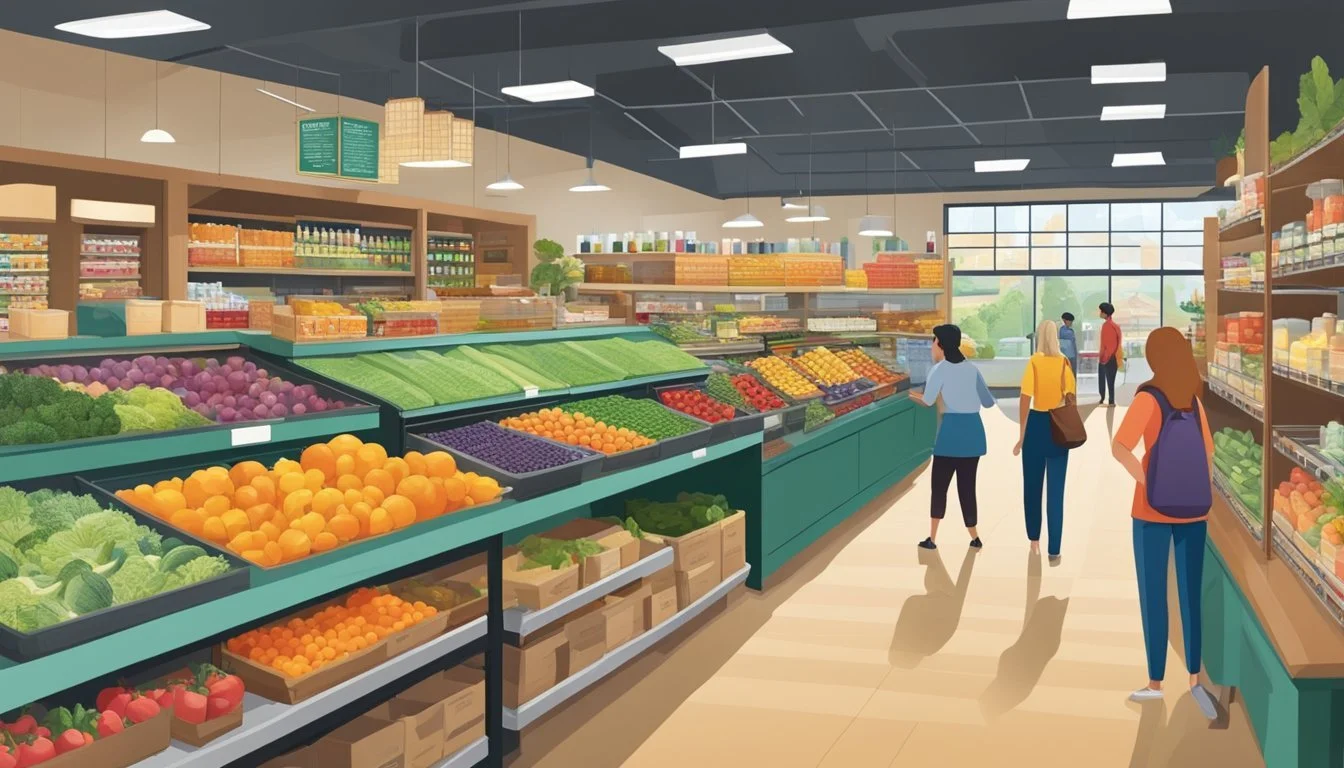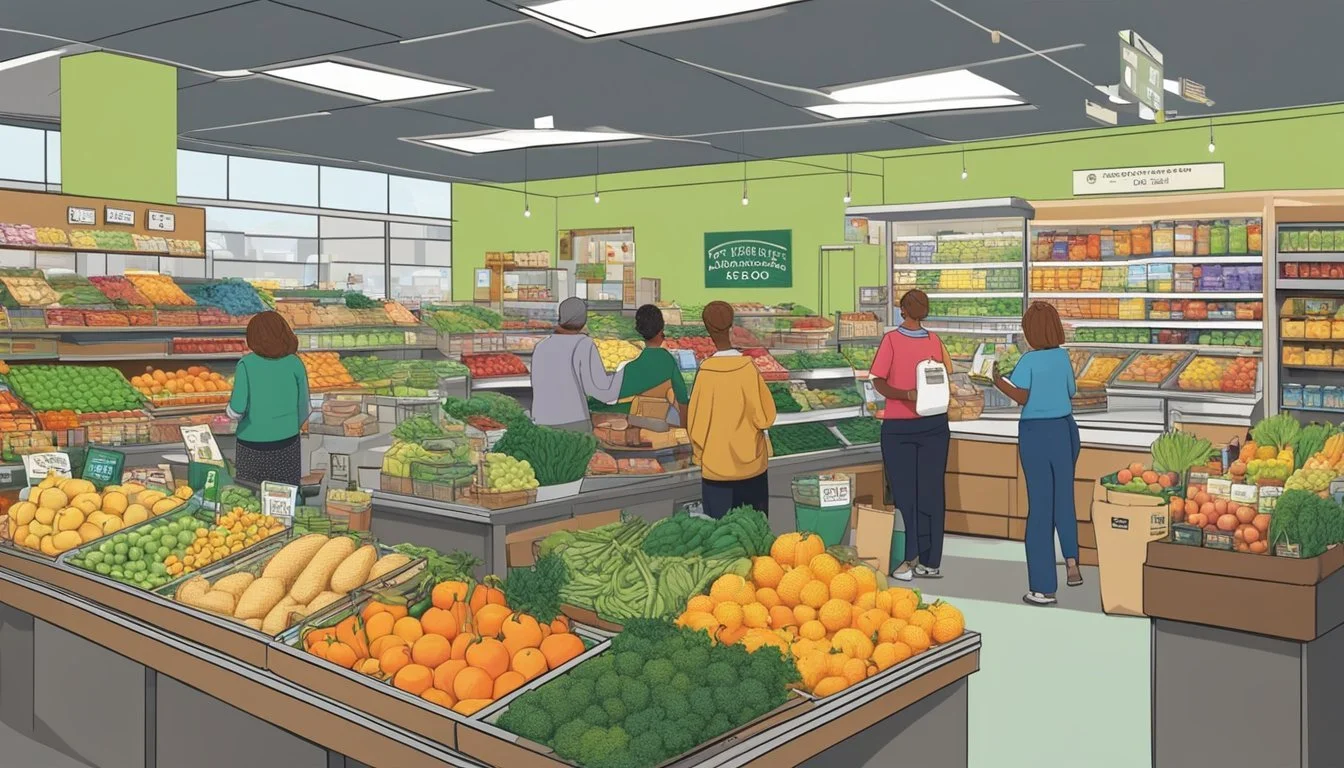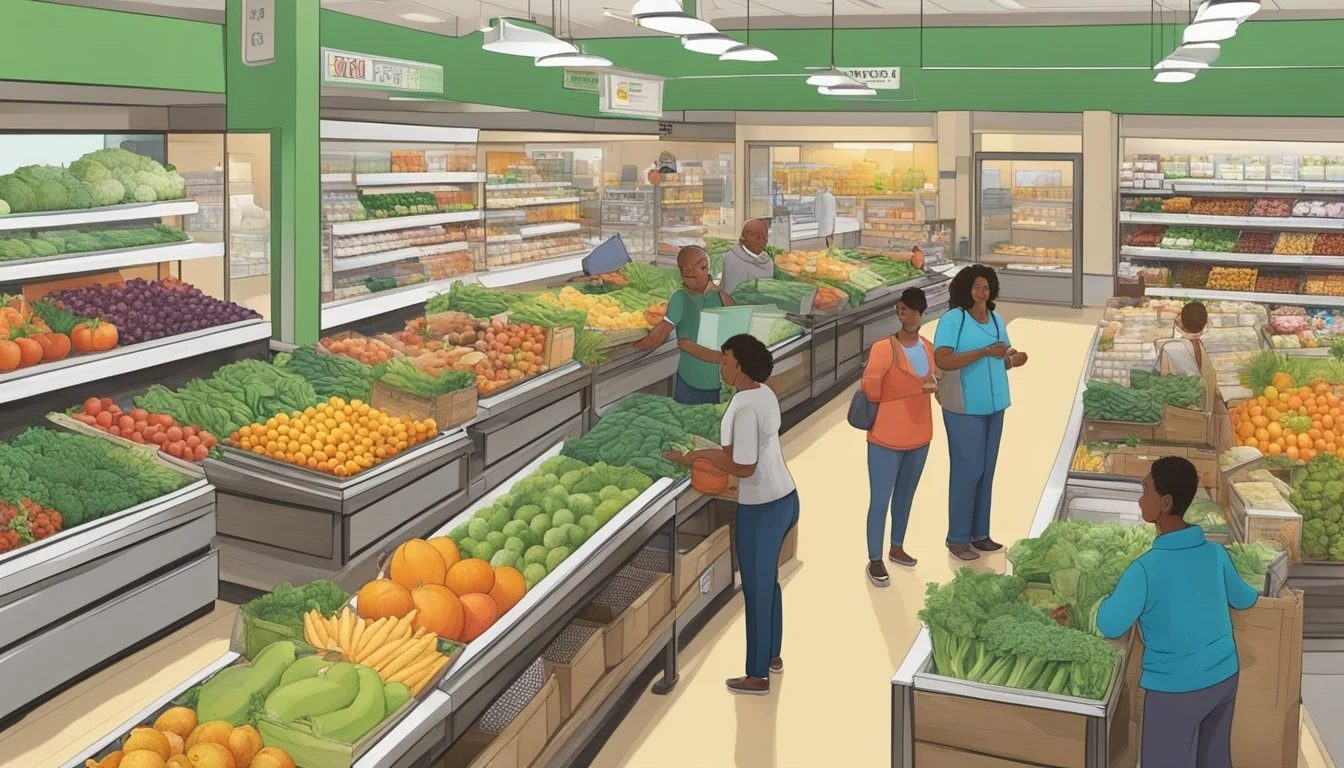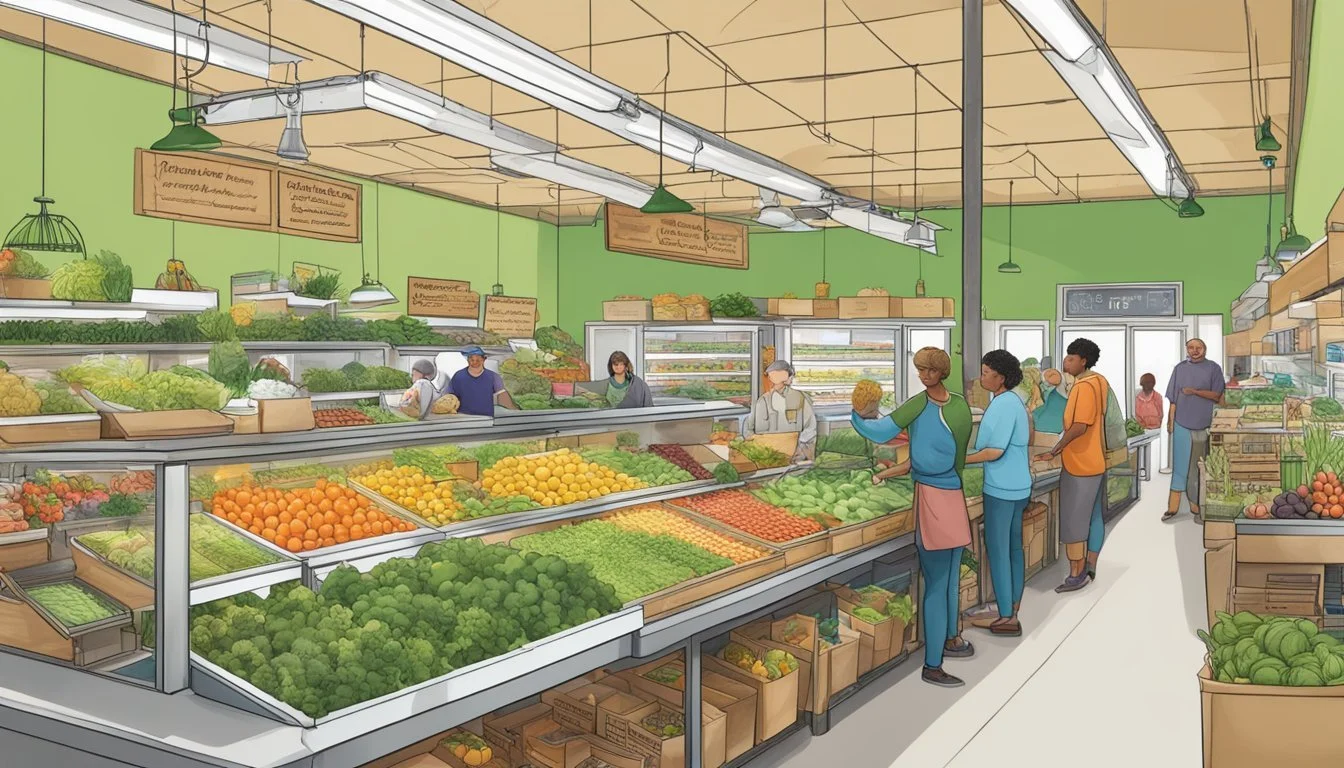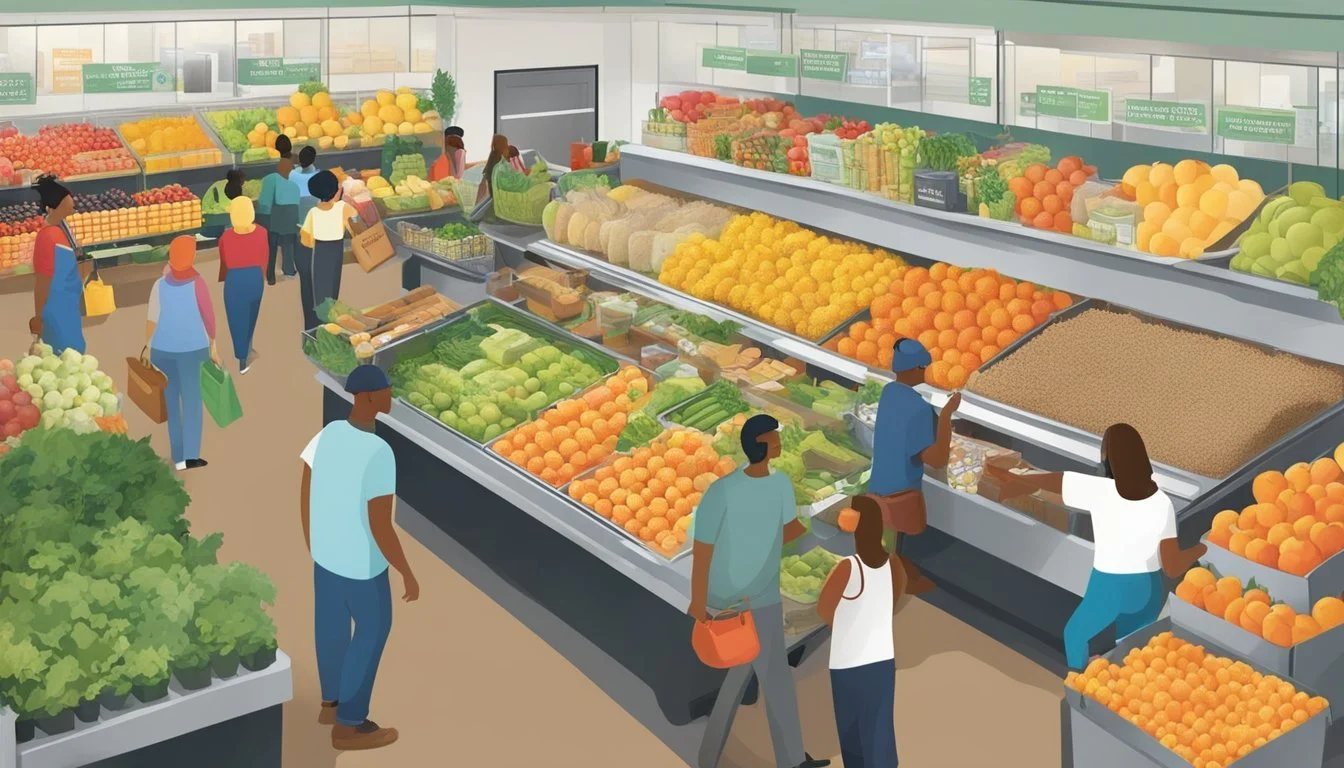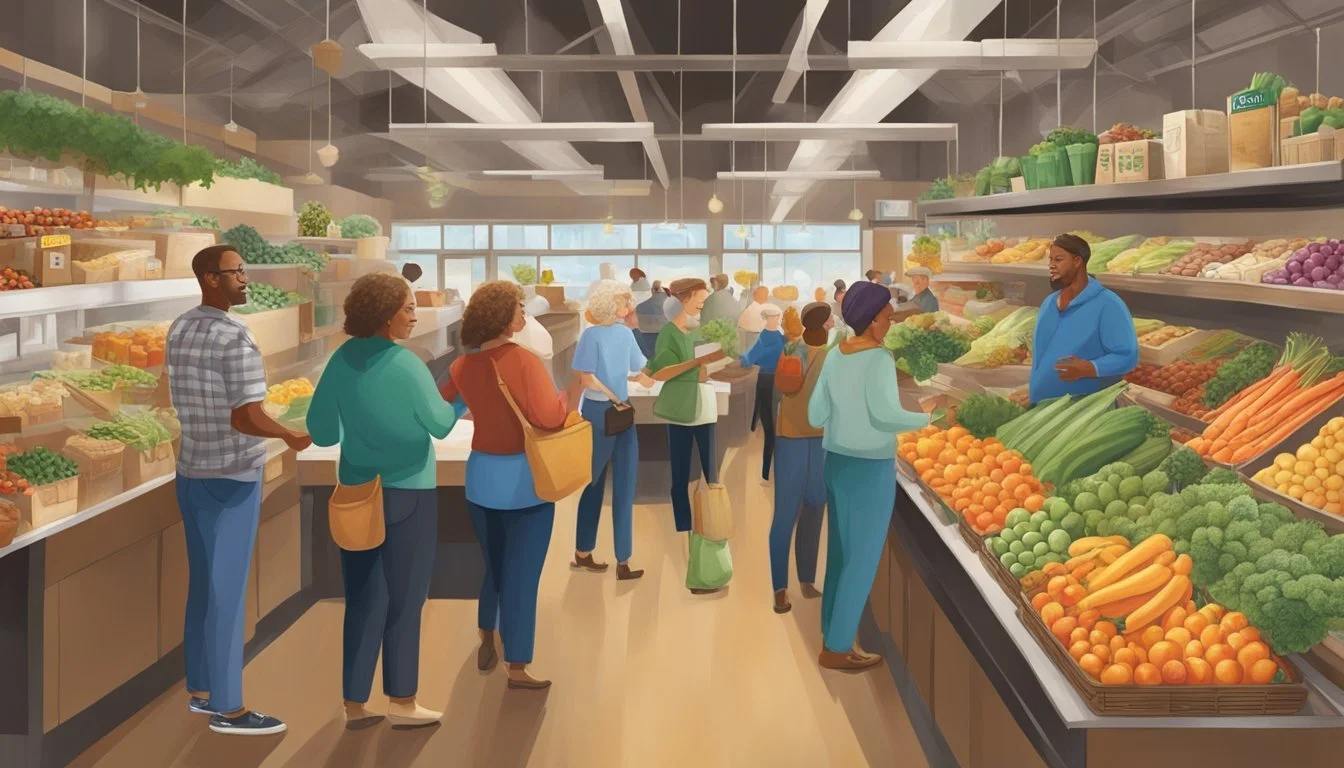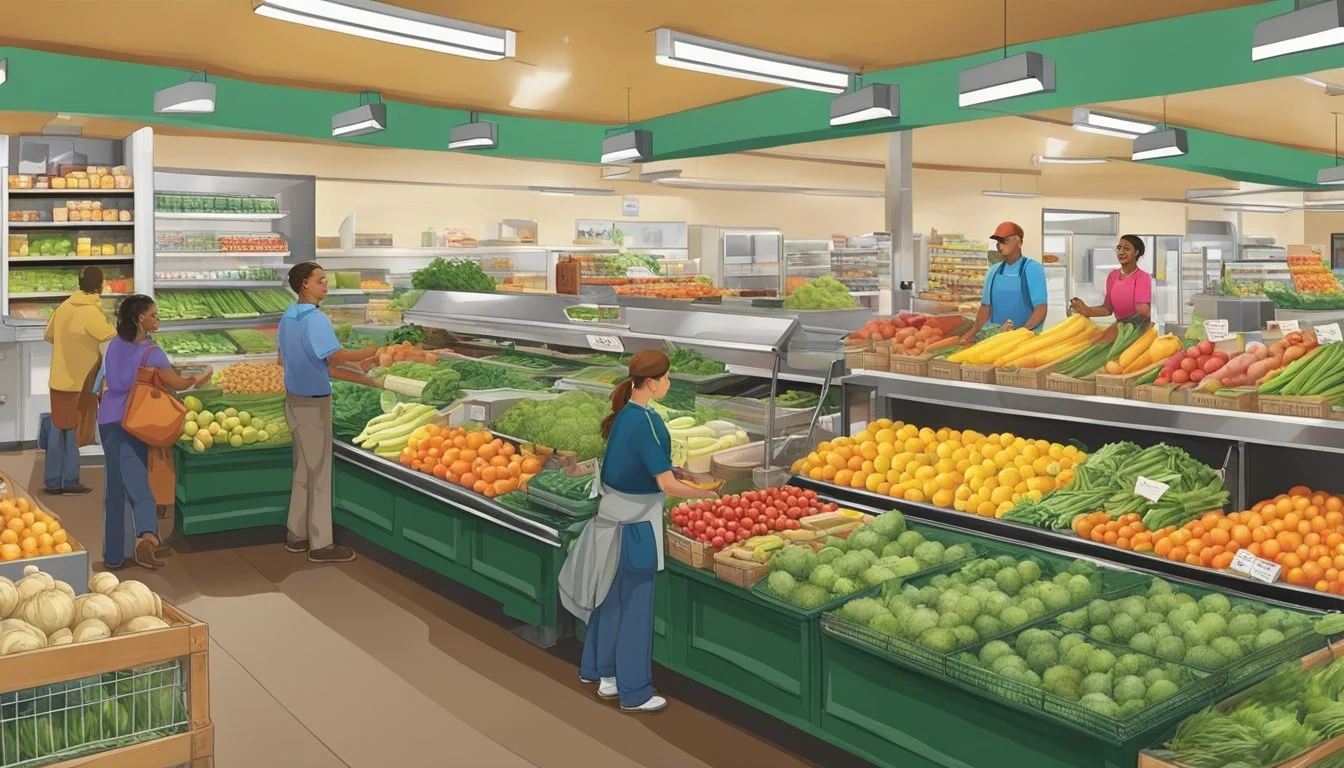Guide to Food Co-Ops in Dayton, OH
Your Essential Resource
Dayton, Ohio, a city known for its pioneering spirit in aviation, is home to an emerging scene of food co-operatives that cater to a community interested in local, sustainable, and cooperative business models. These co-ops serve as a testament to Dayton’s commitment to social entrepreneurship and community development. Food co-ops in the region range from specialized grocery stores like Dorothy Lane Market, which has evolved from a simple fruit stand to a celebrated gourmet food store, to broader initiatives like CO-OP Dayton, which seeks to incubate cooperative businesses that create and retain quality jobs.
In the heart of West Dayton, efforts toward a more equitable food system are materializing through initiatives such as the Gem City Market, a project aimed at addressing the disparity in access to fresh and affordable food. These co-ops are not only food retailers, but also social enterprises designed to serve the Dayton community by focusing on local ownership and decision-making. Meanwhile, in the rural backdrop, Green Field Farms Co-op, connected to the Ohio Ecological Food and Farm Association, exemplifies the connection between rural producers and urban consumers, bridging the gap with a shared commitment to ecological stewardship and sustainable agriculture.
The growing interest in food co-ops in Dayton underscores a wider movement toward community-supported agriculture and an increasing demand for organic and locally sourced foods. These businesses support the local economy by providing jobs, circulating resources within the community, and strengthening the local food system, contributing to what some see as the beginning of a renaissance in Dayton. As a nexus for the food co-operative movement in Ohio, Dayton offers a model for other cities looking to build sustainable food systems through cooperative enterprise.
Understanding Food Co-Ops
In Dayton, Ohio, food co-ops serve as a testament to community-driven efforts in creating a more equitable and locally-focused food system.
Co-Op Basics
A cooperative, or co-op, is a business entity that's owned and democratically controlled by its members. In Dayton, these co-ops generally operate in the realm of grocery retail. Each member has a say in the operations, and profits are typically reinvested into the co-op or shared among members.
Benefits of Joining a Co-Op
Members of a food cooperative in Dayton gain several advantages:
Local Impact: Shopping at a co-op supports the local economy and often features local produce and goods.
Member Control: Members have a stake and a voice in the business decisions, from products stocked to community initiatives.
Quality and Value: Co-ops are known for offering high-quality products at a good value, focusing on the welfare of their members over profits.
Common Misconceptions
While co-ops are well-intended, there are some misconceptions:
Exclusivity: Some believe co-ops are exclusive clubs; however, they are open to all, although members do get certain benefits.
Product Range: There's a myth that co-ops only sell organic or high-end products. In reality, they provide a variety of options to cater to a range of dietary needs and budgets.
Guide to Dayton's Food Co-Ops
The city of Dayton offers a selection of food co-ops, providing access to local, gourmet, and cooperative grocery options tailored to serve the community's needs.
Gem City Market
Location: Northwest Dayton
Features:
Full-service grocery store
Community-led co-op
Description: Gem City Market stands out as a pivotal grocery store catered to rectify the lack of local grocery options in an area previously known as a food desert. This market is distinctive for being worker- and community-owned, emphasizing local participation and investment in the regional food economy.
Dorothy Lane Market
Address: 2710 Far Hills Ave, Dayton, OH 45419
Features:
Gourmet foods
Local produce and products
Description: Dorothy Lane Market began its journey as a fruit stand and has since evolved into a well-known destination for gourmet foods. They offer a premium grocery experience and have been a mainstay in Dayton for shoppers seeking quality ingredients and a diverse selection of groceries.
Co-Op Dayton Overview
Location: Dayton, OH
Core Activities:
Incubating cooperative businesses
Advocating for economic equity
Description: Co-Op Dayton serves as the catalyst for fostering cooperative businesses within the Dayton area, aiming to create sustainable job opportunities and a fair local economy. One of its noteworthy projects includes Gem City Market, demonstrating its role in leveraging the cooperative model to address community needs. Co-Op Dayton provides resources and support for startups, membership campaigns, and transitions to cooperative business models.
Entity Relevance to Food Co-Ops in Dayton Food Co-op Core focus of Gem City Market and Co-Op Dayton initiatives Groceries Offered by both Gem City Market and Dorothy Lane Market Grocery Store Gem City Market represents a full-service grocery store; Dorothy Lane Market is a gourmet grocery store Gem City Market A crucial food cooperative in northwest Dayton Co-Op Dayton The organization behind cooperative businesses including Gem City Market 2710 Far Hills Ave Location of Dorothy Lane Market, a gourmet grocery destination
Membership and Participation
Food cooperatives in Dayton, such as Gem City Market, offer community residents an opportunity to become more than just shoppers—they can become member-owners. Membership is not only a financial investment but also a commitment to sustaining the co-op’s mission and operations.
How to Become a Member
To become a member of a Dayton food co-op, individuals must purchase a membership. For instance, Gem City Market offers a one-time membership purchase that makes the buyer a member-owner. This model is designed to provide long-term value as well as support for the community efforts to increase access to healthy food options.
Member Benefits and Responsibilities
Member-owners typically enjoy a range of benefits, including the following:
Voting Rights: Each member receives a vote in key decisions, ensuring a democratic process within the co-op.
Patronage Dividend: Depending on the co-op's profitability, members may be eligible for a patronage dividend, which relates to the amount they spend at the co-op.
Discounts: Members might be eligible for discounts on purchases. While the exact discount rates can vary, they reinforce the value proposition of membership.
Community Support: By participating, member-owners contribute to a greater cause, such as providing access to fresh food in areas identified as food deserts.
Members are also expected to uphold certain responsibilities:
Engagement: Participation in meetings and votes is encouraged to shape the co-op’s future.
Advocacy: Members may be called upon to promote the co-op and its principles within the wider community.
Certain programs may be in place to support inclusivity among member-owners, such as discounted memberships for individuals receiving WIC or other assistance, ensuring equitable opportunities for all community members.
Community and Economic Impact
In Dayton, Ohio, food cooperatives serve as vital economic cornerstones, supporting local agriculture and creating community-driven job opportunities.
Supporting Local Agriculture
Dayton's food co-ops have a significant role in sustaining local family farms and the surrounding agricultural community. By prioritizing locally grown food, these cooperatives contribute to the local economy and offer residents access to fresh, regional produce. Buying clubs associated with these co-ops facilitate direct consumer support to localharvest, ensuring that the economic benefits are felt within the community.
Local Impact on Agriculture:
Family Farms: Co-ops provide a stable market for small-scale farmers.
Locally Grown Food: They encourage the consumption of fresh, local produce.
Community Ownership and Jobs
Community-owned food co-ops in neighborhoods like West Dayton represent more than just retail outlets; they are hubs of economic activity and social enterprise. These institutions are known for fostering inclusive hiring practices and creating stable employment opportunities for community members. The co-op model is designed to reinvest profits back into the community, driving a more equitable local economy.
Job Creation:
Community-Owned: Jobs created by co-ops keep money circulating locally.
Economic Impact: Co-ops contribute to the economic renaissance of Dayton by incubating new businesses and retaining good jobs.
Educational and Social Initiatives
In Dayton, food co-ops not only provide access to nutritious food but also offer valuable educational programs and engage in social advocacy. They strive to empower the community through learning opportunities and active participation in environmental and social issues.
Co-Op Educational Programs
Co-op Dayton has initiated several educational programs aimed at promoting business and economic understanding. These include the Startup Resource Guide and Co-op U, both designed to educate prospective cooperative members and the public on the benefits and logistics of cooperative business models. Through cooking classes and workshops, participants gain practical skills and knowledge about healthy eating, local food systems, and sustainable living.
Social and Environmental Advocacy
Co-op Dayton and its projects, including Gem City Market, stand as advocates for food justice and economic empowerment. They address the food hardship experienced by many Dayton families, providing access to affordable and healthy food options. By fostering partnerships and community engagement, these co-ops enhance local wealth-building and connect the dots between social well-being and environmental stewardship.
Collaboration and Expansion
In Dayton, Ohio, food co-ops have become crucial in fostering community involvement and economic growth. These collaborative efforts involve alliances with local businesses and the launch of new cooperative projects that utilize various resources, including makerspaces, tools, and skills.
Partnering with Local Businesses
Food co-ops in Dayton actively seek partnerships with local enterprises to bolster community ties and provide broader access to local produce and products. By collaborating with area farmers, artisans, and service providers, food co-ops contribute to a sustainable economic ecosystem that benefits all stakeholders. For instance, Gem City Market, Dayton's first cooperative grocery store, sources from nearby growers and transitions into a space where shoppers not only find fresh, healthy food but also local specialties.
Growth and New Co-Op Projects
Expansion in Dayton's cooperative sector is marked by the initiation of diverse projects aimed at creating jobs and driving local investments. Co-op Dayton, an incubator for cooperative businesses, is instrumental in this growth, supporting the development of startups that share resources and expertise. This includes fostering projects that extend to various areas, from renewable energy initiatives to community-owned makerspaces, which offer tools and skills development to members and the public. These new ventures exemplify the cooperative model's adaptability and commitment to community enhancement.
Sustainable Practices
Sustainable practices within food co-ops in Dayton prioritize both environmental responsibility and the promotion of health and wellness. These co-ops implement methods that contribute positively to the ecosystem while ensuring that the community has access to nutritious and wholesome food.
Environmentally Friendly Operations
Food co-ops in Dayton adopt environmentally friendly operations by carefully selecting seeds and engaging in ecologically sound farming methods. They support small family farms, like those within the Green Field Farms Co-op, which follow traditional farming practices. These include rotational grazing and organic agriculture, which minimizes chemical inputs and promotes soil health. The emphasis is firmly placed on reducing the carbon footprint through local sourcing, thus cutting down on transportation emissions commonly associated with moving produce.
Local food systems reduce the environmental impact by:
Leveraging biodegradable materials for packaging
Employing composting practices to recycle organic waste
Utilizing renewable energy sources where possible
Promoting Health and Wellness
The co-ops take a holistic approach to health and wellness. They offer a selection of fresh, locally-grown fruits and vegetables, and pasture-raised meat, ensuring that the community has access to nutrient-dense food options. The Mission of Mary Cooperative, an urban farm and community resource located in East Dayton, exemplifies this commitment by educating residents on sustainable agriculture and nutritious diets. Through these efforts, co-ops support wellness for members and non-members alike.
Efforts to support health and wellness include:
Hosting educational workshops on nutritious eating habits
Providing an assortment of healthy food choices from local producers
Encouraging active community participation in food selection and preparation
Challenges and Opportunities
The persistent presence of food deserts in Dayton and the creative structures within cooperative models both reveal the challenges and opportunities faced by the city's food co-ops.
Addressing Food Deserts
Food deserts stand as a significant challenge in Dayton, particularly in low-income areas where access to fresh, affordable food is scarce. Non-profit organizations and co-op initiatives such as Gem City Market are at the forefront of tackling this issue. By operating in northwest Dayton, a known food desert, Gem City Market strives to fulfill the crucial need for nutritional food options. Their work has transformative potential for local residents, creating an oasis where there was once scarcity.
Key Entities Involved: Non-profit organization, Gem City Market.
Objective: Providing fresh, nutritious, and affordable food to underserved communities.
Innovations in Co-Op Structure
Dayton's co-ops leverage unique structural innovations like profit-sharing with member-owners and partnering with different sectors such as credit unions and electric cooperatives. The co-op model extends its influence beyond food, with entities like breweries hinting at the model's versatility. The inclusion of community programs and collaborations reflects a focus on more than just economic gains—it emphasizes community well-being and sustainability.
Key Entities Involved: Food co-ops, credit unions, electric cooperatives, member-owners.
Innovative Strategies:
Profit-sharing among member-owners.
Multi-sector partnerships and collaborations.
Emphasis on community health and wellness programs.
Additional Resources and Contacts
When looking to navigate the food cooperative landscape in Dayton, OH, it's crucial to have the right contacts and resources. This guide provides direct pathways to local directories and networking opportunities necessary for both budding and established co-ops.
Local Co-Op Directories
For those searching for a comprehensive directory of local food co-ops, Yellow Springs and Salem Avenue are notable mentions. They represent a wealth of community-engaged food cooperatives.
Yellow Springs: A vibrant hub with a focus on local and organic produce.
Salem Avenue: Home to initiatives supporting access to healthy, sustainable foods.
Co-Op Networking and Support
Networking and support are the backbones of any cooperative effort. In Dayton, entities such as Fifth Street Brewpub provide a model for co-op success, emphasizing community involvement and member ownership.
Fifth Street Brewpub: A member-owned brewery in Dayton that exemplifies cooperative principles in a business setting.
Co-ops seeking developmental help and technical assistance can look to regional resources in Athens, Columbus, and Delaware for broader support networks that extend beyond Dayton.
Athens: Known for its cooperative initiatives and support systems within the region.
Columbus and Delaware: Nearby cities offering additional networks and resources for co-op development and expansion.
Networking events and joint ventures are encouraged between co-ops across these cities to foster growth and sustainability within the cooperative sector.
Conclusion
Dayton, Ohio, exhibits community resilience through its support for local food co-operatives. Co-op Dayton is a prominent organization that catalyzes the growth of cooperative businesses, such as food co-ops, which enhance local job creation and foster an economy beneficial to all residents. The initiative has spawned noteworthy projects like the Gem City Market, aimed at tackling food access challenges in the region.
Community voices, such as Kenya Baker, advocate for a shift in perspective, suggesting "food apartheid" as a more accurate term than "food desert" to describe food scarcity issues in areas like West Dayton. This reflects a deeper comprehension of the systemic barriers that affect food equity.
The Ohio State University's Center for Cooperatives and entities such as Dorothy Lane Market further illustrate Ohio's investment in cooperative endeavors and local food commerce. These establishments contribute not only to the state's cooperative landscape but also to Ohio's reputation as a home for some of the top-performing cooperatives nationally.
The growth of food co-ops in Dayton is a testament to the power of collective action and the pursuit of sustainable, equitable food systems. By fostering cooperative principles and prioritizing the well-being of its community, Dayton remains steadfast in its mission to build a more inclusive and thriving local economy.


